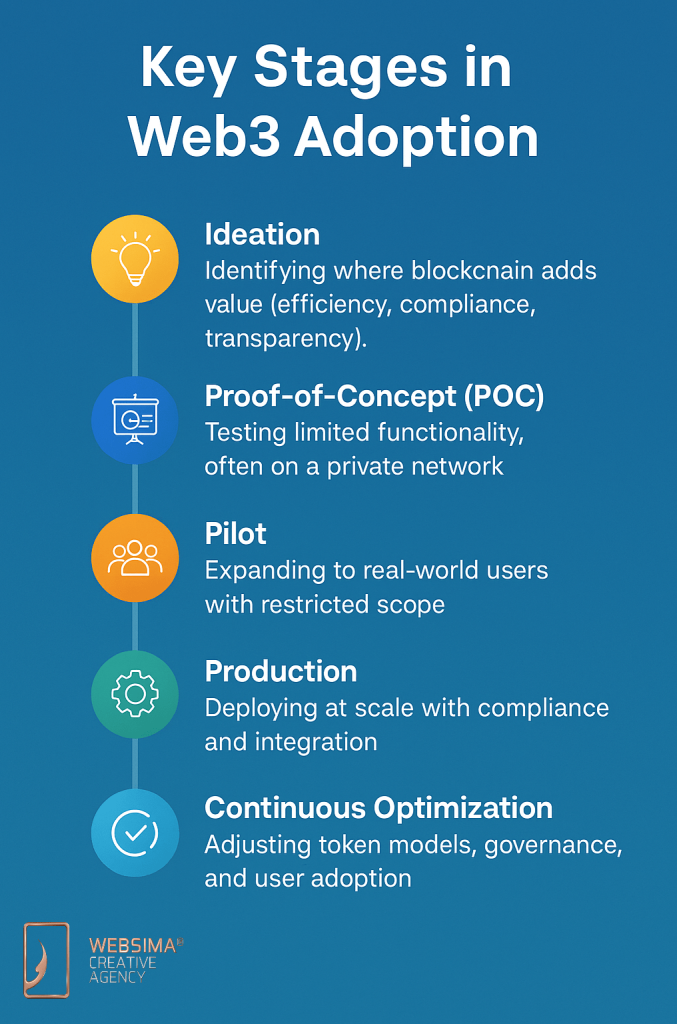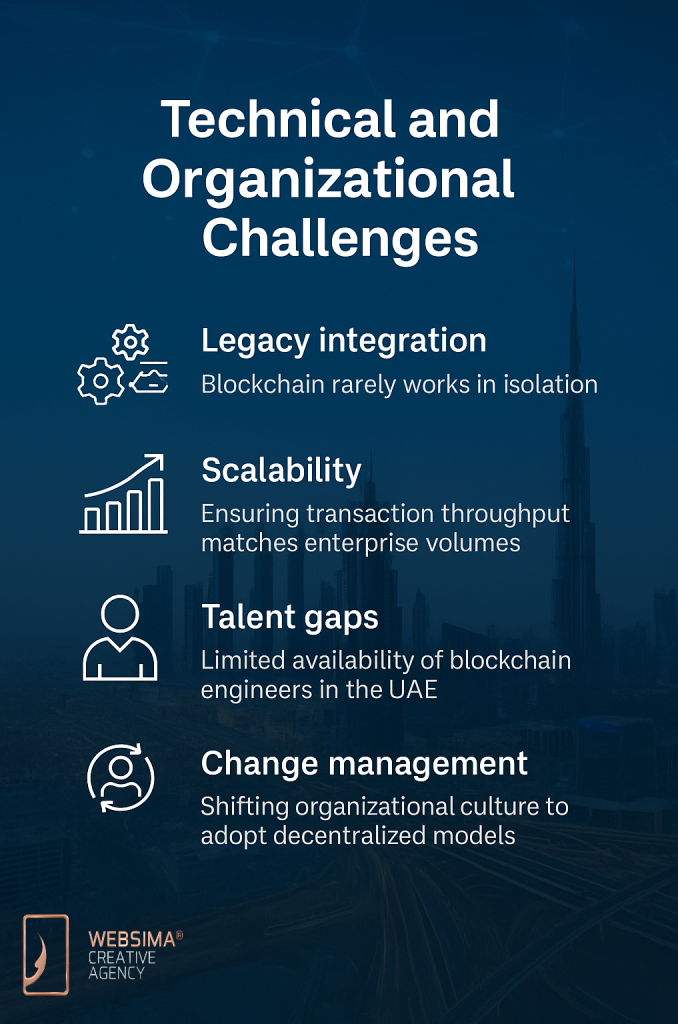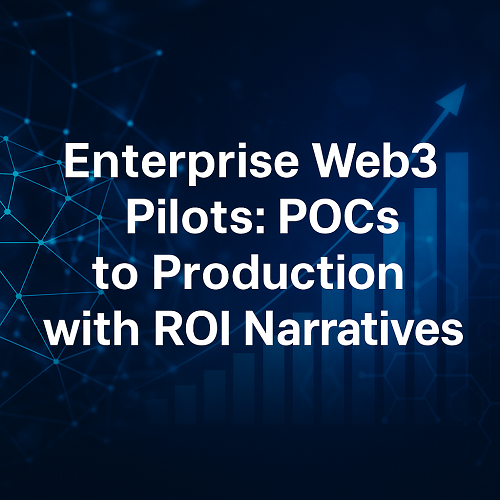Table of Contents
- Introduction
- Why Web3 Pilots Matter for Enterprises in Dubai
- From POC to Production: Key Stages in Web3 Adoption
- ROI Narratives: Making the Business Case
- Case Studies of Enterprise Web3 Dubai Adoption
- Real Estate Tokenization Initiatives
- Supply Chain Provenance Projects
- Trade Finance and Cross-Border Settlements
- Energy and Sustainability Credits
- Technical and Organizational Challenges
- Common Mistakes Enterprises Make
- Costs and Resource Considerations
- The Regulatory Landscape in Dubai and UAE
- Risks and Challenges for Enterprise Web3 Pilots
- Outlook 2025–2030
- Final Thoughts
- FAQs
- Work with Websima
Introduction
Web3 adoption in Dubai has moved beyond hype into structured enterprise pilots. From tokenizing assets to digitizing supply chains, organizations are exploring proof-of-concepts (POCs) that can mature into full-scale production systems.
Yet the challenge isn’t just technical — it’s about articulating a return on investment (ROI) narrative. Decision-makers need clarity on how distributed ledgers, tokenization, and smart contracts drive measurable business value.
In this article, we explore how enterprise Web3 Dubai initiatives transition from pilots to production, highlighting real-world case studies, ROI frameworks, and the evolving regulatory context.
Why Web3 Pilots Matter for Enterprises in Dubai
Today, I visited Google’s Dubai offices, where I explored their latest artificial intelligence initiatives. We take pride in our longstanding partnerships with global technology leaders who have chosen Dubai as their regional hub. We remain committed to strengthening these… pic.twitter.com/wqBcDDbp35
— Hamdan bin Mohammed (@HamdanMohammed) May 12, 2025
Dubai has positioned itself as a Web3 innovation hub, with initiatives like:
- The Dubai Blockchain Strategy, launched to integrate blockchain across government services.
- The establishment of VARA (Virtual Assets Regulatory Authority) to oversee blockchain-based finance.
- Sector-specific pilots in logistics, energy, healthcare, and property.
According to a World Economic Forum case study, Dubai’s early adoption of blockchain across government operations demonstrates how carefully managed pilots can deliver lessons for enterprises transitioning from POCs to production.
From POC to Production: Key Stages in Web3 Adoption

- Ideation — Identifying where blockchain adds value (efficiency, compliance, transparency).
- Proof-of-Concept (POC) — Testing limited functionality, often on a private network.
- Pilot — Expanding to real-world users with restricted scope.
- Production — Deploying at scale with compliance and integration.
- Continuous Optimization — Adjusting token models, governance, and user adoption.
Dubai enterprises often move faster than global peers, driven by government mandates and international investor interest.
ROI Narratives: Making the Business Case
Executives demand tangible ROI from pilots. Narratives include:
- Cost reduction — Automated reconciliation saves millions annually in trade finance.
- New revenue streams — Tokenized assets enable fractional ownership and liquidity.
- Compliance gains — Immutable audit trails meet regulatory requirements.
- Reputation and ESG alignment — Carbon credit pilots help enterprises meet sustainability goals.
CIO Magazine estimated that UAE-wide blockchain adoption could save USD 3 billion annually through efficiency gains — a clear ROI argument.
Case Studies of Enterprise Web3 Dubai Adoption
Real Estate Tokenization Initiatives
- The Dubai Land Department has piloted tokenisation with private-sector partners, enabling fractional ownership and instant settlement.
- According to Global Government Fintech, the DLD launched a pilot phase for tokenised real estate, aimed at attracting both institutional and retail investors. Similar innovations are emerging in Islamic finance, where Dubai is exploring tokenized Sukuk structures that merge Shariah compliance with global DeFi liquidity
Supply Chain Provenance Projects
- UAE ports have explored blockchain-based provenance to track goods from origin to Dubai warehouses.
- Enterprises report reduced fraud and improved customs clearance times.
Trade Finance and Cross-Border Settlements
- Banks in DIFC and ADGM are testing blockchain platforms for trade document digitization.
- A 2024 pilot reduced settlement times from 10 days to under 24 hours, unlocking liquidity for exporters.
Energy and Sustainability Credits
- Dubai Electricity and Water Authority (DEWA) has explored blockchain for solar credits under Shams Dubai.
- Tokenized renewable credits support UAE Net Zero 2050 goals.
Technical and Organizational Challenges

Enterprises face barriers such as:
- Legacy integration — Blockchain rarely works in isolation.
- Scalability — Ensuring transaction throughput matches enterprise volumes.
- Talent gaps — Limited availability of blockchain engineers in the UAE.
- Change management — Shifting organizational culture to adopt decentralized models.
Common Mistakes Enterprises Make
- Treating POCs as marketing exercises without ROI measurement.
- Ignoring compliance until late-stage deployment.
- Over-engineering token models that users don’t understand.
- Relying solely on technology without governance frameworks.
Costs and Resource Considerations
- POCs: USD 50,000–200,000 depending on scope.
- Pilots: USD 500,000–2 million, often requiring consortium partners.
- Production deployments: USD 5–20 million, including compliance and integration.
Appinventiv highlights that enterprises investing in blockchain integration in Dubai often budget beyond technology — governance, talent, and compliance add significant costs.
The Regulatory Landscape in Dubai and UAE
Dubai’s regulators encourage innovation but demand accountability:
- VARA licenses for virtual asset service providers.
- DIFC and ADGM provide frameworks for tokenized securities and trade finance.
- ESCA oversees investment-related platforms.
Enterprises piloting enterprise web3 Dubai solutions must integrate regulatory alignment early. The Dubai Land Department’s tokenisation announcement shows how regulators actively monitor enterprise pilots.
Risks and Challenges for Enterprise Web3 Pilots
- Regulatory uncertainty — Evolving frameworks may delay production.
- Interoperability — Multiple chains and standards complicate adoption.
- Cybersecurity — Smart contract exploits can cause reputational damage.
- Adoption hurdles — Users may resist tokenized processes without clear incentives.
Outlook 2025–2030
Enterprise adoption of Web3 in Dubai is set to accelerate. Trends include:
- Institutional tokenization of real estate and sukuk markets.
- Blockchain-enabled green finance and ESG reporting.
- Expansion of cross-border settlement corridors between UAE, India, and Africa. These corridors mirror Dubai’s experiments with blockchain-powered remittance platforms designed for its largest worker populations from India, Pakistan, and the Philippines.
- Government-led pilots maturing into production ecosystems.
The World Economic Forum concludes that Dubai’s collaborative approach between regulators and enterprises is key to achieving production-scale Web3 adoption.
Final Thoughts
For Dubai enterprises, Web3 is no longer a theoretical experiment. It is a practical toolkit for efficiency, trust, and innovation.
The transition from pilot to production requires more than technical expertise — it demands narrative discipline. Executives, regulators, and investors must all see how blockchain delivers measurable ROI, whether through cost reduction, new revenue streams, or enhanced compliance. Projects that clearly frame their outcomes in financial and strategic terms are the ones most likely to scale successfully.
Enterprises should also recognize that Web3 adoption is not a one-time event but a continuous journey. Token models evolve, user adoption grows in phases, and regulations adapt over time. The winners will be those enterprises that build flexible strategies, continuously measure performance, and remain responsive to both local UAE policies and global standards.
Ultimately, the enterprises that treat enterprise Web3 Dubai initiatives as long-term infrastructure investments — rather than temporary pilots — will set the benchmarks for digital trust, international competitiveness, and sustainable innovation across the region.
FAQs
What is a Web3 POC?
A proof-of-concept demonstrating blockchain viability in a controlled setting.
How do enterprises measure ROI?
By quantifying cost savings, efficiency gains, and new revenue streams.
Which sectors in Dubai are leading in Web3 adoption?
Real estate, logistics, finance, and energy.
Is Web3 adoption in Dubai regulated?
Yes — overseen by VARA, DIFC, ADGM, and ESCA.
What makes enterprise web3 Dubai adoption unique?
Government backing, international investor interest, and proactive regulation.
Work with Websima
At Websima, we help enterprises in Dubai move from Web3 pilot projects to production systems. Our team delivers technical expertise, compliance guidance, and ROI-driven strategies.
Whether you’re tokenizing assets, digitizing supply chains, or building blockchain-based financial solutions, Websima ensures your Web3 journey aligns with Dubai’s regulations and global best practices.
Ready to take your enterprise web3 Dubai project to the next stage? Contact Websima today to transform your pilot into a scalable success.





